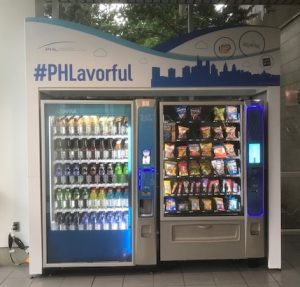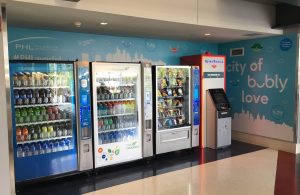The best customer engagement companies in the world benefit from pouring rights agreements with one of the two largest global beverage companies.
These leading customer-focused organizations leverage the funding and the extensive consumer insights given by beverage companies to improve the customer experience at their own properties.
You should do the same. If you do, you will find yourself in great company.
On Forbes’ recent ranking of “The 10 Most Customer-Obsessed Companies”, of the two companies who have business models that support pouring rights (companies like Zappos, Netflix, and Dollar Shave Club don’t lend themselves to beverage deals), both have beverage deals: Ritz Carlton and Disney. Ritz Carlton has a pouring rights deal with Pepsi. Disney has a pouring rights deal with Coke for all of its theme parks in the US (and either Coke or Pepsi for its parks outside of the US).
Similarly, a simple scan of Fortune’s “World’s Most Admired Companies” list reveals that for the companies that produce the most ardent, loyal fans, pouring rights are simply a best practice. Among the top 30 companies are Walt Disney (Coke), Southwest Airlines (Coke), Marriott (Pepsi), Singapore Airlines (Coke), Home Depot (Coke) and Delta Airlines (Coke).
Industry Leaders Adopt Pouring Rights
Among the industries in which Enliven operates (airports, hospitals, and restaurant chains):
- Two of the top five airports on JD Power’s Airport Satisfaction ranking have pouring rights,
- The three largest healthcare systems in the United States all have a beverage deals, and
- Virtually every restaurant chain has a beverage deal.
Again, it’s clear that industry leaders pursue pouring rights deals.
In fact, it’s just hard to imagine any iconic brand, from Chick-fil-A to Wrigley Field and everywhere in-between, not being paired with a leading beverage company.
Why Pouring Rights Deliver for Consumers
Pouring Rights deals may at first seem sound counter-intuitive. Some would imagine that the companies most focused on pleasing their guests would want to satisfy both the Coke and Pepsi fans while they engage with their brands. Some would believe that the collective wisdom would be to stock both brands – both Coke and Pepsi – at your property in order to please all guests.
Those people would be wrong. There’s much more at play than some might initially imagine.
Why do the best customer engagement companies negotiate pouring rights? Here are at least three reasons:
1. Pouring Rights Allow Companies to Collaborate with the Most Powerful Brands in the World
Coca-Cola and PepsiCo are not simply just two of the world’s leading beverage brands; they are among two of the most iconic, valuable brands, period. Combined, the two brands represent more than $78B in brand value, $33B in brand revenue, and $6B in brand advertising. These parent companies exist to invent and market their child brands. One could argue they are marketing agencies disguised as beverage companies.
As such, it’s important to understand that a key aspect of Coke and Pepsi’s business model is to pursue strategic brand partnerships, which serve as a platform to promote their own brand. The goal of the beverage company is to pair the memorable customer experience that their partners offer (whether it be the enjoyment of a movie, the thrill of a theme park, the satisfaction of a delicious meal, or the anticipation of the vacation that is just one flight away) with their beverage product. When you celebrate that come-from-behind win of your local football franchise, Coke and Pepsi both want you to be raising their product in the air to toast a friend.
Coke and Pepsi help brands create enjoyable moments that guests remember — unforgettable moments that increase their satisfaction with their experience with the brand.
Why? Coke and Pepsi are placing a bet that the next time you are at a grocery market or a convenience store, the positive brand association with their product will yield to a decision to purchase their brand over a competitor.
Even more, because the beverage companies want to instill a memorable experience, they will enlist their brand teams and marketing brain-trusts to develop experiential marketing campaigns that simply are not possible outside an exclusive relationship.
For instance, in preparation for the opening of the highly anticipated Star Wars section of its theme park, Disney and Coca-Cola announced a unique bottle that was developed for the one-of-a-kind attraction. The bottle was shaped as a Star Wars droid and featured Star Wars typography.
At one of our clients, Philadelphia International Airport, Pepsi recently enlisted a local athlete with which they had partnered– Philadelphia Eagles’ Tight End Zach Ertz – to compete with passengers and employees in a variety of games. The impact of the event extended beyond the halls of the airport, as participants quickly fed their social media feeds with images of them trying to beat the pro athlete.
These types of events are only made possible when brands collaborate through a beverage deal. The most customer-centric companies don’t fear that a beverage deal will exclude some of their fans, but rather dream up new ways that a beverage partnership could elevate their customer’s experience.
2. Companies Leverage a Beloved Brand to Improve the Customer Experience
While Coke and Pepsi want the benefit of associating their brand with the best companies and properties in the world, the opposite is also true. The best brands in the world engineer their brand to be associated with other world-class brands. There are few bigger worldwide brands than Coca-Cola and PepsiCo.
As an example, when we are engaged to work with large hospital systems, it is not uncommon for us to find off-brands such as Shasta and Cott being served to patients. When we ask for the rationale, the administrators invariably tell us that they’d prefer to serve a more well-known and desired product, but are prohibited by budget constraints and cost-cutting measures. Patients that have recently undergone a severe operation are being served off-brand products. What’s worse is that Medicare reimbursement rates are now tied to customer satisfaction ratings. When you are confined to one hospital room after a very serious operation, the smallest gestures can have a disproportionate impact. A lower satisfaction rating caused by the simple fact that an off-brand soda was served could lead to disastrous results.
You can imagine the delight that results when we are able to negotiate a beverage deal that yields net pricing that is comparable to – or even better – than the off-brand competitor. Not only are these hospitals able to serve a superior product, but the customer’s experience has now been elevated.
It’s not uncommon for us to hear concerns from prospects that by entering into a beverage partnership, their properties will end up looking like a NASCAR vehicle – full of garishly sized advertisements plastered on every wall. The truth is that, as two of the most premier merchandizers and advertisers in the world, Coke and Pepsi will work with their partners to develop and activate marketing that is both elegant and “on-brand”, serving to elevate your customer’s experience. When handled properly, Coke and Pepsi will work directly with their partners’ marketing departments to ensure that promotions align with their partner’s brand. Finally, on this point, you can rest assured that every good beverage deal contract clearly states that the host property (you) must approve any beverage company marketing efforts that are conducted onsite or with your brand, in any way, anywhere.
Similarly, prospects are also often concerned that associations with the “big sugar soda companies” is off-brand. Coke and Pepsi are both willing, and in fact eager, to collaborate with their partners to showcase their healthier, innovative brands (such as LIFEWTR, SmartWater Sparkling, or Bubly).


This is all made possible with a pouring rights agreement. Without a beverage partnership, companies simply do not have access to the marketing talent and breadth of expertise that are available within the beverage companies – and as a result, their brand will not receive the positive benefits of brand association.
3. Pouring Rights Generate Funds that Allow Companies to Invest in The Customer Experience
When a brand or a property chooses to pursue a pouring rights relationship with either Coke or Pepsi, the decision yields more than simply a beverage partner and a product price list. As a part of the strategic beverage partnership, Coke and Pepsi are prepared and eager to significantly invest in their partner’s business.
Of course, for host properties that currently buy their own beverages, the 20-50% savings that could result from a best-in-class beverage deal will free up cash flow to invest in the customer experience. Beyond those savings, however, the pouring rights agreement itself, if properly negotiated, will allow for tremendous investments in the guest experience.
For example, in the recent agreement between Coca-Cola and Dallas-Fort Worth International Airport (DFW), as a part of the agreement, Coke committed to installing and maintaining 5 separate kids play areas. Coke committed $1,250,000 (at minimum) to this effort.

A recent healthcare beverage deal we helped negotiate (for a community-based hospital system) earmarked tens of thousands of dollars for community partnerships, guaranteed appearances by mascots of sports teams with which they are partnered at the children’s hospital and provided dozens of tickets to sports events and ski resorts to raffle to guests and employees every year of the agreement.
The University of Oregon’s recent beverage deal outlined that the beverage partner would fund sustainability measures, healthy campus initiatives, diversity programs, two summer interns and a campus intern, sizable in-kind product support, and more.
Pouring rights agreements allow companies to invest even further into improving the experience that a customer has with their brand.
Are You in Good Company?
If companies that are most celebrated for their obsession with serving their customers and creating the most raving fans all – without exception – have beverage deals, then it begs the simple question: why don’t you?
If you have issues freeing up the funds required to take on an important initiative pertaining to improving your customer’s experience, why not enlist the beverage companies to fund the projects for you?
if you are simply out of fresh ideas on how to improve a nagging customer service issue, why not challenge the beverage companies to collaborate and solve the problem with you?
If you do, you will find yourself in great company.
Related Articles:
Won’t My Patients and Nurses Revolt if I Sign a Beverage Deal?
3 Reasons Coke & Pepsi Want Direct Relationships with Airports
Photo by Park Troopers on Unsplash